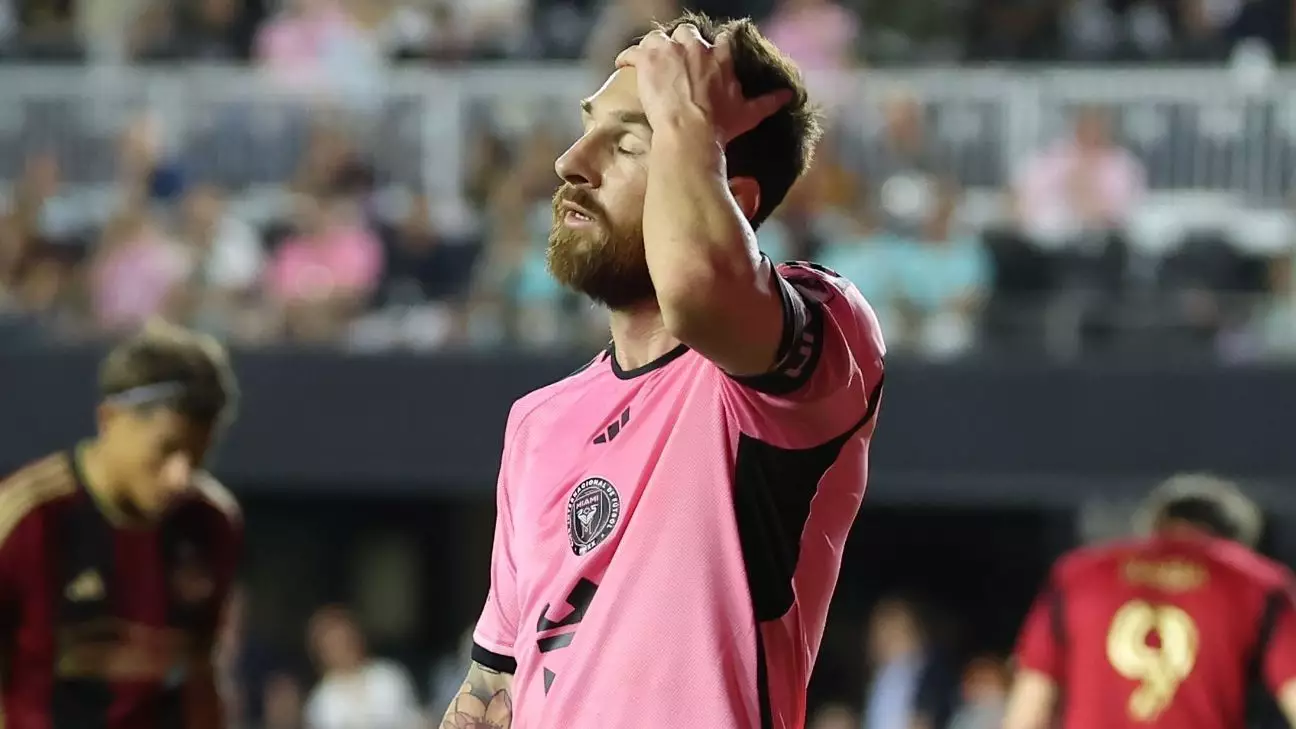The 2024 Major League Soccer playoffs turned into a nightmare for Inter Miami as they were unexpectedly ousted in the first round, losing 3-2 against Atlanta United. This shocking exit at Chase Stadium highlights a shocking twist in a season characterized by immense promise and high expectations. With star player Lionel Messi leading the way, Inter Miami entered the postseason as the top seed, boasting a historic record that helped the club clinch its first Supporters’ Shield. Yet, their dreams were shattered by an Atlanta team that finished the season with considerably less momentum, underscoring the unpredictable nature of playoff sports.
In this crucial third game of their Eastern Conference series, Messi’s earlier heroics seemed to have levelled the game when he scored a second-half header. However, the match’s turning point came with Bartosz Slisz’s decisive goal in the 76th minute, which was mired in controversy. At the time of the goal, defender Tomás Avilés was on the ground in the penalty area requiring medical attention, raising questions about sportsmanship and the integrity of the officials’ decisions. The moments leading up to Slisz’s goal, combined with Miami’s failure to capitalize on set-piece opportunities through Messi, illustrate a team that struggled under pressure when it mattered most.
For a team that scored an impressive 79 goals over the regular season—benefiting from the prolific talents of Messi and Luis Suárez—Miami’s elimination serves as a potent reminder of how the postseason is often a land where expectations meet harsh realities. The match unfolded with Miami taking an early lead through Matías Rojas, only to find themselves quickly equalized and subsequently trailing just minutes later. This back-and-forth nature of the game revealed severe defensive weaknesses in Miami’s lineup, suggesting a lack of cohesion and urgency under duress.
Atlanta’s victory not only illustrated their resilience, as they clawed back from a deficit to eliminate a top-seed, but it also signified one of the biggest playoff upsets in MLS history. Miami’s inability to contend with Atlanta’s relentless pressure—as well as Brad Guzan’s exceptional performance in goal—created an insurmountable gap. For a club filled with high-profile talent, such an early playoff exit raises questions about tactical decisions and whether the current roster configuration can convert potential into playoff success.
Among the many anticipated headlines of 2024, Inter Miami’s high expectations were inevitably tied to having Messi onboard. The Argentine superstar’s influence was expected to spur the club’s success not just in regular-season games but especially in the playoffs. However, the harsh reality is that individual brilliance does not guarantee collective success, as seen in Miami’s early exit. Team dynamics, defensive strategies, and crucial game-time decisions played significant roles in this disappointing outcome, leading to questions about the coaching staff’s readiness to adapt under pressure.
Moreover, Miami’s contract expenditure provides a stark contrast to their playoff performance. Messi’s annual compensation alone eclipsed that of the entire Atlanta roster, illustrating a glaring disparity that did not translate into winning outcomes. Under the watchful eye of co-owner David Beckham, the team has needed more than just star power—they require tangible results to justify their record expenditures and high-profile acquisitions.
As Inter Miami reflects on this season’s disheartening end, the organization must now pivot towards the future. Their early exit sets the stage for an intense roster reshuffle ahead of the 2025 season. Potentially losing star forward Suárez, whose contract nears its conclusion, poses another layer of complexity for the franchise moving forward. Discussions over his future reveal the urgency required to maintain momentum and competitiveness in a rapidly evolving league landscape.
Additionally, the team will have to prepare for their participation in the expanded 32-team Club World Cup, where they will face a broader array of competitive dynamics on an international stage. The initial strategies to build the roster, improve tactical discipline, and address personnel gaps will be vital for Miami to re-establish itself as a championship contender. As they reassemble, the combined lessons of this season’s heart-wrenching playoff exit will surely weigh heavily in their approach to reclaiming their position as a household name in Major League Soccer.

